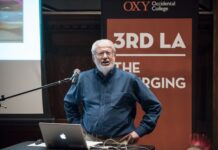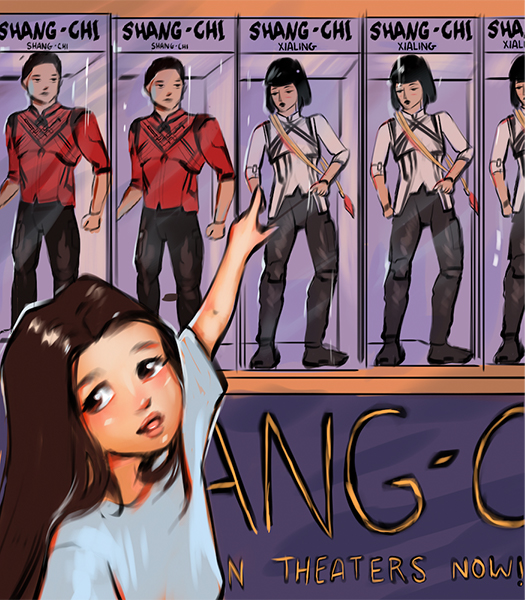As a kid in China I went through childhood with Cinderella schoolbags, James P. Sullivan stickers and Mickey and Minnie Mouse pencil cases. I looked forward to holiday trips to Hong Kong Disneyland and was coaxed into watching the latest Hollywood title every Friday by my CGI and IMAX-loving dad. Naturally, I also grew up with stories from the Marvel Cinematic Universe (MCU).
I enjoyed the movies, their plots and even the action scenes, but my attachment to the superheroes never lingered. For me, the MCU was more symbolic than anything else. It was a beacon of American culture — its creativity, technology and the industrial maturity that consistently turned the outrageously imaginative into reality. Tony Stark, Captain America, Thor and Black Widow were all vessels of this idea of “America.” It is possible that my love for the latter induced my love for the former.
Watching “Shang-Chi and the Legend of the Ten Rings” was a different experience. While delivering the usual predictability and comfort of a classic superhero story, “Shang-Chi” also offered me a surprisingly personal, sometimes intimate, experience about a glorious but broken Asian family.
Son of the legendary warlord Xu Wenwu (Tony Leung) and Ying Li (Fala Chen), the gatekeeper of the mythical world Ta Lo, Xu Shang-Chi (Simu Liu) is born into a loving household in southern China. After his birth, his parents decide to sever ties with their respective worlds and lead a regular life — that is, until one of Wenwu’s former enemies kills Ying Li. In a fit of vengeance and rage, Wenwu puts on the Ten Rings — a set of mythical armbands that give him insurmountable power — after years of casting them aside, and regresses to his dictatorial self. He reboots the army while putting his son Shang-Chi under rigorous training to become an assassin. During his first assignment from his father to kill the man that killed his mother, Shang-Chi flees and settles in San Francisco with his adopted name Shaun, He leads a stress-free life as a valet driver until a machete-arm assassin engages him in a remarkable kung fu fight.
What’s astonishing is the majority of the film’s dialogue is in Mandarin Chinese with English subtitles. Unlike other contemporary American films that draw on Asian or Asian American experiences — such as “The Farewell,” “Crazy Rich Asians” and “Mulan” — “Shang-Chi” embraces the multilingual exchanges that corporate directors are quick to avoid. The single conversation of Awkwafina’s character Katy, Shang-Chi’s slovenly bestie, speaking English to her Chinese-responding grandmother is adorable. At times the emotional subtlety is lost in the translation, but to writer-director Destin Daniel Cretton’s credit, he brought in a phenomenal cast of Asian and Asian American actors who are multilingual and have the multicultural background to translate both the story’s emotional and cross-generational conflicts.
Tony Leung, the actor that plays Shang Chi’s father and the story’s main antagonist, plays an irreplaceable role. The legendary Hong Kong actor brings his familiar, dangerous elegance to his character with fitting bigotry and ferocity, making Wenwu perhaps the most emotionally complex antagonist in the MCU. His obsessive lust for power resembles an extreme Asian patriarch, as he orders his best men to murder his son with the confidence that even the deadliest assassins could not beat him, but he also protects him as if by instinct when the real danger comes. At heart, he is just a father, which solidifies Leung’s powerful reclamation of this Marvel villain considering its racist history.
Cretton pays homage to Leung and the martial arts culture with shots that are reminiscent of ones in Hong Kong classics and Chinese cinema. The scene depicting Xu Wenwu’s standing in front of a stone wall sensing a love and loss that nobody else can evokes the ending of “In the Mood for Love.” A mesmerizing fight between Leung and Fala Chen reminds one of the martial arts classic “Crouching Tiger, Hidden Dragon.” It is magical watching Leung and Chen blending into the MCU world as if they have always belonged.
Other supporting cast — such as Meng’er Zhang’s character Xialing Xu, the sister that Shang-Chi leaves behind when he flees, and Ronny Chieng’s Jon Jon, Xialing’s friend and host of her underground fighting realm — deserve appreciations as well. A Chinese actress and a first-timer to Hollywood production, Zhang’s performance captures the character’s repressed grievance as an undervalued child and her immense resilience. I could only imagine how an Asian American girl watching Xialing with her flying rope dart might feel.
Marvel may be not be the first to come to mind when it comes to cultural appreciation and representation, but however unlikely and imperfect it may seem, “Shang-Chi” is a breakthrough. With good intention, deliberation and genuine attention, maybe there is a way forward.
![]()


































